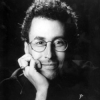Tony Kushner

Tony Kushner
Anthony Robert "Tony" Kushneris an American playwright and screenwriter. He received the Pulitzer Prize for Drama in 1993 for his play Angels in America: A Gay Fantasia on National Themes. He co-authored with Eric Roth the screenplay for the 2005 film Munich, and he wrote the screenplay for the 2012 film Lincoln, both critically acclaimed movies, for which received Academy Award nominations for Best Adapted Screenplay. For his work, he received a National Medal of Arts from President Barack Obama...
NationalityAmerican
ProfessionScreenwriter
Date of Birth16 July 1956
CityNew York City, NY
CountryUnited States of America
Accuracy is paramount in every detail of a work of history. Here's my rule: Ask yourself, 'Did this thing happen?' If the answer is yes, then it's historical. Then ask, 'Did this thing happen precisely this way?' If the answer is yes, then it's history; if the answer is no, not precisely this way, then it's historical drama.
You have a strange relationship with calamity when you're a writer: you write about it; as an artist, you objectify and fetishize it. You render life into material, and that's a creepy thing to do.
The theater requires an essential gullibility that you can't get through life without having. If all you can feel is skepticism-well , you meet people like this. Run away from them. They're not good people.
And I don't consider Broadway the acropolis of theatrical art. I mean Broadway is commercial - that's what it is. It's expensive seats and a lot of them that have to be filled every night. Off-Broadway and Off-Off Broadway, as far as I'm concerned, is in New York the pride of New York theater.
As much as I hate his movies, Oliver Stone has an aspiration I admire, and that is that he wants his art to be part of what makes and changes public policy and cultural practice.
I write everything with fountain pens. I don't know why. I've done it since I was bar mitzvahed. I was given a fountain pen, a Parker fountain pen, and I loved it, and I've never liked writing anything with pencils or ball-points.
I'm fairly certain when I die that the obituary will say, 'Author of 'Angels in America' dies.' Unless I'm completely forgotten, and then it won't say anything at all.
The way you give love is the most profoundly human part of you. When people say it's ugly or a perversion or an abomination, they're attacking the center of your being.
Gay writers now have both a sense of history and the fables that allows them to dwell in the realms of the ridiculous and at the same time talk seriously about things.
The big influence on me was Robert Altman, who, especially in 'Nashville,' transformed my sense of dramatic structure and showed how you could handle overlapping stories.
One of the things I learned in 'Slavs!' is that it's much easier to talk about being gay than it is to talk about being a socialist. People are afraid of socialism, and plays that deal with economics are scarier to them.
I find writing very difficult. It's hard and it hurts sometimes, and it's scary because of the fear of failure and the very unpleasant feeling that you may have reached the limit of your abilities.
When I'm writing a new play, there's a period where I know I shouldn't be out in public much. I imagine most people who create go through something like this. You willfully loosen some of the inner straps that hold your core together.
I'm a sort of political person, and I feel that there's a kind of ineradicably political dimension to theater, to all theater, whether it's overtly political or not.